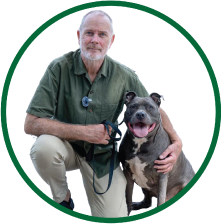Are You Mothering Your Puppy Too Much?
 The Hidden Cause of Separation Stress
The Hidden Cause of Separation Stress
Separation stress is one of the most common behavioural issues I see in dogs—and more often than not, it begins in the first few weeks after a puppy is brought into the home. What many loving dog owners don’t realise is that excessive nurturing during this early stage—what I call “over-mothering”—can have long-term psychological consequences.
Let’s break it down.
What Happens in Nature?
In a natural environment, a mother dog doesn’t just feed and cuddle her puppies endlessly. She instinctively starts creating emotional distance once they reach a certain age. She may prevent them from feeding, growl or nudge them away, and encourage exploration rather than constant attachment. This is all part of helping her puppies develop emotional resilience, self-regulation, and the ability to cope with frustration.
It’s a vital process—one that helps puppies become balanced, confident dogs.
What Happens in the Average Home?
When a new puppy enters a home, the natural detachment process often stops cold. Out of love and excitement, many families give their puppy constant attention. The pup is picked up frequently, allowed to follow people around the house all day, and comforted the moment it whines or shows signs of distress.
This might feel like the right thing to do—after all, it’s just a baby—but this constant reinforcement of dependency can cause serious issues down the track.
The puppy learns very quickly that it can’t cope on its own. It never learns how to self-soothe, settle independently, or wait calmly for its needs to be met. Fast forward a few months, and we now have a dog that panics the moment it's left alone—even for a few minutes.
The Psychology Behind It
Just like children, puppies need emotional boundaries to grow into well-adjusted adults. Without those boundaries, they remain in a perpetual state of neediness. The brain doesn’t develop the tools required to manage frustration, boredom, or short periods of isolation. This often manifests as:
- Excessive barking, howling, or whining when left alone
- Destructive behaviours (chewing, digging, tearing up furniture)
- Pacing, panting, drooling, or other signs of stress when anticipating separation
- A general lack of confidence or inability to settle
All of this can often be traced back to how the puppy was nurtured—and whether it was given the opportunity to build independence.
How to Raise a Confident, Emotionally Stable Puppy
The good news is, with the right balance of love and leadership, you can raise a puppy that’s both emotionally secure and deeply bonded to you—without the dependency.
Here are some practical tips to help you get started:
1. Create a Calm, Structured Environment
Avoid overstimulating your puppy with constant excitement and attention. Keep interactions calm and purposeful. Over-excitement teaches your pup to live in a highly aroused state, which makes it harder to cope with solitude or boredom.
2. Teach Your Puppy to Spend Time Alone
Use a crate, playpen, or safe space where your puppy can rest away from you—even while you’re home. Start with short intervals and gradually increase the time. This teaches your puppy that it's okay to be alone and that nothing bad happens when you're out of sight.
3. Don’t Respond to Every Whimper
If your puppy whines or cries for attention, wait until they’ve calmed down before responding. Rushing in too quickly teaches them that emotional distress is a reliable way to get what they want. Instead, reward calm behaviour and build emotional resilience.
4. Establish Boundaries and Rules
From day one, set clear boundaries. Don’t allow your puppy to follow you from room to room all day. Teach “place” or “bed” commands and reward the puppy for staying put. Boundaries build trust and emotional security, not distance.
5. Socialise Wisely
Socialisation doesn’t mean letting your puppy run wild with every dog or stranger. It means exposing your puppy to new environments, people, and experiences in a calm and controlled way—building confidence without overstimulation.
6. Use Affection Strategically
Affection is a powerful tool, but like all tools, it must be used at the right time. Reward your puppy with affection when they are calm, settled, or showing good decision-making—not when they are frantic, clingy, or demanding.
Final Thoughts
Raising a puppy isn’t just about showering it with love—it’s about preparing it for life. That means sometimes saying “no,” setting limits, and giving your puppy the chance to cope, learn, and grow. Just like a mother dog instinctively lets go at the right time, you too need to give your puppy the emotional space to develop into a stable, confident adult dog.
Do it right, and you’ll have a dog that doesn’t just love you—but trusts you, respects you, and can thrive both with you and without you.
If you’d like help raising your new puppy the right way, feel free to contact me for a personalised training plan. I offer in-home puppy training for puppies aged 8–16 weeks, with a strong focus on emotional development, structure, and healthy socialisation.
